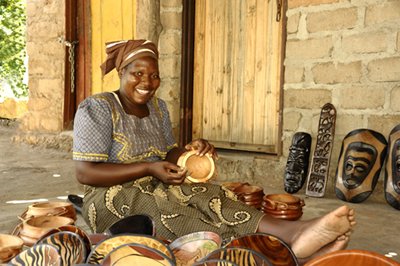Today, tourism generates 10% of the world's GDP, 1 in every 10 jobs and 30% of world trade in services. It is key to many countries' economies and livelihoods.
The United Nations General Assembly has designated 2017 as the International Year of Sustainable Tourism for Development, underscoring its power to help eradicate poverty.
Tourism is also singled out in three of the 17 Sustainable Development Goals - part of an ambitious global plan adopted by the international community in 2015 that is setting the tone for development through to 2030. Specifically, tourism is tied to the goals on sustainable economic growth and decent employment, sustainable production and consumption, as well as the conservation and sustainable use of oceans.
The issue of how to link tourism and sustainable development is in focus this week at the 41st Annual World Tourism Summit. Hosted by Rwanda, one of East Africa's premier tourism destinations, the international meeting runs from Monday to Thursday at the Kigali Conference Centre.
Organised by the Corporate Council on Africa and Africa Travel Association in collaboration with the Rwanda Development Board, the summit brings together African leaders, international investors and travel professionals from across the world to explore how tourism can spur economic growth and job creation across the continent.
- Economic Development in Africa Report 2017: Tourism for Transformative and Inclusive Growth
- Economic development in Africa 2017 (Overview)
- Exploiting the potential of tourism for transformative growth in Africa
The high-level conference will focus on innovative business models, new technologies and strategic partnerships in Africa and globally. It will also provide a platform to network and explore new tourism markets and products, including the promotion and preservation of Africa's rich cultural heritage and wildlife.
"This is a great opportunity to present and review tourism on the continent. The sector's growth presents enormous economic opportunities that spread throughout societies," said UNCTAD Secretary General Mukhisa Kituyi.
"Africa's tourism industry continues to flourish and supports more than 21 million jobs and, for the developing countries, tourism is a enormous tool for sustainable development," added Dr. Kituyi.
UNCTAD's Economic Development in Africa Report 2017: Tourism for Transformative and Inclusive Growth, examined the role that tourism can play in Africa's development process. The report, released last month, concluded that tourism can be an engine for inclusive growth and a complement to development strategies aimed at fostering economic diversification and structural transformation within an appropriate policy context.
"Tourism's impact on the economic and social development of African countries can be huge. We must manage tourism properly in order to enjoy its fruits without leaving anyone behind," said Dr. Kituyi. "To succeed, we must put in place adequate policies, forge public-private partnerships, ensure free movement as well as peace and security".
Rwanda remains one of the world's fastest-growing tourist destinations, second only to Southeast Asia, and recorded tourism revenue of more than US$400 million in 2016, up from US$370 million in 2015.
"Sustainable tourism must ensure viable, long-term economic operations, providing benefits that are distributed fairly among all stakeholders," said Dr. Kituyi
On the sidelines of the summit, organisers in partnership with with Facebook and Dignify Africa will be delivering training sessions to small and medium enterprises on how to leverage digital tools to grow their businesses.

